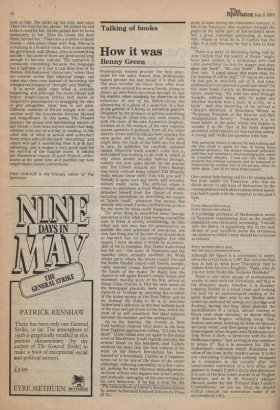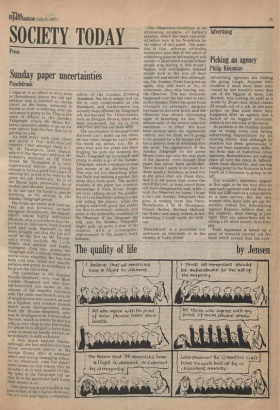Talking of books
How it was
Benny Green
Professional writers provide the best anecdotes for the same reason that professional ' bakers provide the best bread; it is their job.
The poor novelist sits there hour after hour with towels around his several heads, trying to dream up anecdotes succulent enough to sate his readers, when suddenly he observes in the behaviour of one of his fellow-slaves the glimmering of a ghost of a suspicion of a hint of the genesis of a funny or revealing gesture. Delighted by the prospect of getting something for nothing he takes this tiny seed, waters it with the tears of his own hysterical laughter, lavishes on it the manure of his own superior nature, protects it jealously from all the other literary crows and blackbirds busy playing the same game, and at last, when all those who might deny the truth of the fable are too dead to care, he publishes his carefully polished cameo. Objective truth doesn't come into it, and indeed has nothing to do with it, which is why when stories become famous enough, nobody can ever quite decide on the precise text. Did Gilbert actually say Tree's Hamlet was funny without being vulgar? Did Whistler really rebuke Oscar with "You will, you will"?
Nobody is quite sure any more, and certainly nobody really cares. The arch-liar when it comes to anecdotes is Ford Madox Ford, who defended himself from the charge of manufacturing moonshine by describing his output as "poetic truth", whatever that means. But nobody who reads Fordie's brilliant lies gives a fig any more for what really happened.
The other thing to remember about literaty anecdotes is that what I find boring you will be sure to think is utterly scintillating, so that when any one man has the presumption to publish his own selection of anecdotes, the very last thing any of the rest of us should do is to reproach him for his oversights. For this reason I have decided it would be unreasonable of me to complain that James Sutherland has left out * the story of Tennyson and the squeaky stays, unjustly snubbed the Wells dinner party where the house caught fire and the butler handed round cold towels, inexplicably omitted Conan Doyle's experiences at the hands of the manic Dr Budd, lost the chance to tell again Barrie's totally bogus and extremely moving story of his first arrival at Kings Cross Station to find his own name on the newspaper placards, been unjust to the memory of Trollope by spurning the incident of the stolen money at the Post Office, and so on. Instead, the thing to do is to welcome Sutherland's selection as the best bedside book of the year and get down to the text, which for most of us will constitute the ideal balance between the familiar and the unexpected.
As to the familiar, the crowds at New York harbour clamour once more as the boat from England approaches calling "Is Little Nell dead?" Lizzie Siddal dies yet again in the damp room at Blackfriars, Keats regards stoically the arterial blood on the bedsheet, and Carlyle receives the news that the first volume of his work on the French Revolution has been burned by a housemaid. Carlyle as it happens, turns out to be one of the stars of the entire anthology, reducing irascibility to a fine comic art, making the most hilarious misjudgements on those writers who happen not to be Carlyle, and ironically upstaging all his own writing by his own behaviour. If he has a rival for the ' *The Oxford Book of Literary Anecdotes Edited by James Sutherland (Oxford University Press prize, at least during the nineteenth century, it has to be Tennyson, who wanders through the pages of the latter part of Sutherland's book like a great comedian pretending to forget who, where or what he is. If Carlyle has the edge, it is only because he had a wife to help him.
There is a story of Browning being told by Jane Carlyle that the poetry of Keats "might have been written by a seamstres,s who had eaten something too rich for supper and slept upon her back". "Do you think", Browning then asks, "I cared about this more than for the barking of a little dog?" Of course he cared., He had got an anecdote out of it, and what professional ever spurned a good anecdote? On the other hand, Carlyle on Browning is even better, observing, "My wife has read through Sordello without being able to make out whether Sordello was a man, or a city, or a book". And also deserving of its revival is Carlyle's definition of Monckton Milnes as "Perpetual President of the Heaven and Hell Amalgamation Society". Tennyson is a lot more subtle, to the point where one begins to wonder if at the time of his most inspired anecdotal achievements he was not fast asleep. A young lady walks the gardens with him:
They paced the terrace in silence: he said nothing and she was afraid to speak for fear of losing some priceless utterance. The silence remained unbroken until they had returned to their starting-point, when he remarked abruptly, 'Coals are very dear'. She received this without comment and he remained in abstraction for another tour of the terrace, when he spoke again, 'I get all my meat from London'.
One cannot help feeling sad for the young lady, but even sadder for Tennyson, who was no doubt driven to this kind of distraction by the correspondence with idiot readers which surely 'reached its peak with the response to the poet's lines
Every minute dies a man, Every minute one is born.
A Cambridge professor of Mathematics wrote to Tennyson complaining that as the world's population was constantly increasing, "I would take the liberty of suggesting that in the next edition of your excellent poem the erroneous calculation to which I refer should be corrected as follows:
Every moment dies a man, and one and a sixteenth is born.
although the figure is a concession to metre, since the actual ratio is 1.167. But not even that was as bad as what poor Thackeray had to endure from his own daughter, "Papa, why do you not write books like Nicholas Nickleby?"
There is one other group of scenestealers worthy to rank with the Victorians, and that is the Romantic poets, whether it is Southey trapping Shelley in a small room and locking the door for an uninterrupted reading of the latest Southey epic, only to see Shelley slide under the table and fall asleep; or Coleridge and Southey, having not long since planned the establishment of a utopia, almost coming to blows over some triviality; or Byron dining with Samuel Rogers, refusing soup, fish, mutton and wine, insisting he lives on biscuits and soda water, and then going to a club for a meat-supper; when Rogers asks Hobhouse how long Byron is likely to persevere with his diet, Hobhouse replies, "Just as long as you continue to notice it". But it is anecdote No. 224 in Sutherland's collection which illustrates the value of the form in the creative sense. It is the one concerning Coleridge's unlikely escapade, as a volunteer in the cavalry after the, unsuccessful conclusion of a love affair, and appears in Joseph Cottle's Early Recollections. It is one of the best comic stories in all English literature, and in E. M. Forster's A binger Harvest, under the title 'Trooper Silas Tomkyn Comberbacke', we can see what the shrewd critical essayist can sometimes make of an unconsidered trifle.
I suppose if an editor is sixty-nine or thereabouts, draws the old age pension and is entitled to cheap travel on the buses, someone is bound to start wondering who his successor is going to be. That is the
state of affairs at the , Sunday Telegraph, where Mr Brian Roberts's apparent ability to go on for ever cannot hide the fact that he is getting on a bit.
As with every such case, there are quite a few well-fancied runners. Chief amongst them is J. W. M. Thompson, once deputy editor of The Spectator and now Mr Roberts's assistant at 135 Fleet Street. Mr Thompson is a very experienced fellow, and young enough to have a good few years of editorial life in him if he were to be given the job. Politically, he is of
the liberal right; personally, he is modest and likeable; journalistically, he can turn his hand to almost anything, as his articles in the Sunday Telegraph prove.
His rivals are many and various. They do not, however, include Peregrine Worsthorne, the deputy editor, whose highly individual life-style, plus a notorious four-let ter word on television, have forced Lord and Lady Hartwell to tell Perry straight out that the job will never be his. Nor do Mr Tliomp son's rivals include Mr Colin Welch, that amiable and highly intelligent chap who graces the
Telegraph with a certain inimitable throw-away elegance. He, too, has
been told that, while not exactly persona non grata, he is unlikely to be given the editorship. One candidate is Mr Gordon Brooke-Shepherd, who was liorn Freddie Shepherd and who dou ble-barrelled his name at the request of his wealthy baroness wife. Her name was Broeck, so a bit of anglicisation was needed, as well as a hyphen, and Gordon sounds much more distinguished than Fred. Mr Brooke-Shepherd, who was in Intelligence in Vienna after the war, which is where he met his wife, is very close to the Hartwells, for whom he is alleged to have done some mysterious family service, so he is clearly in with a chance.
A very much fancied runner, although one less well-known than those mentioned above, is Mr George Evans, who is assistant editor and acting managing editor. As he effectively runs the paper, there seems no real reason why he Shouldn't do it with benefit of title.
My spies at the Telegraph tell me that he is the particular dark horse their money is on.
One name much canvassed in the past is that of Mr Charles Wintour, the ice-cool and highly competent
--editor of the London Evening Standard. But he is simply not on. He is very comfortable at the Standard, and furthermore has actually been offered the Telegraph job, but has said 'No.' Other names, such as Douglas Brown, have also been mentioned, but he is over sixty-five and has not been well. The uncertainty is because Lord Hartwell can't make up his mind. He has other things he can't make his mind up about, too. He is sixty-four and for years has been flogging his guts out keeping the Daily Telegraph up to scratch and trying to make a go of the Sunday Telegraph, which continues to lose him money at an alarming rate. This was not too disturbing when the Daily was making a packet, but those days have gone. The money troubles of the paper are common knowledge in Fleet Street. People are even talking about the possibility of Lord Hartwell calling it a day and selling the papers, while the going is relatively good. But others say that is extremely unlikely, and point to the unhealthy condition of the Observer. If the Observer did fold, then the Sunday Telegraph might pick up quite a few of its readers, with a consequent improvement in the paper's bank balance.



































 Previous page
Previous page